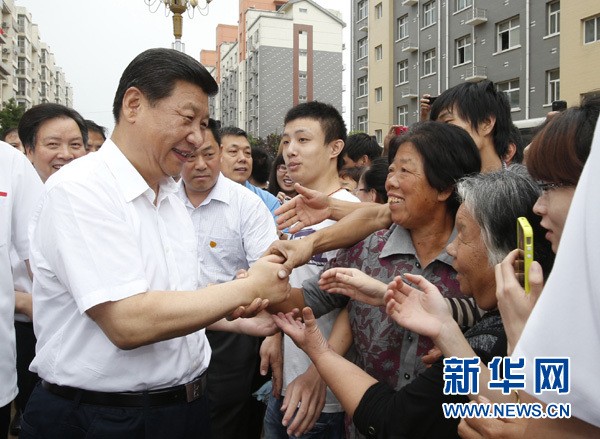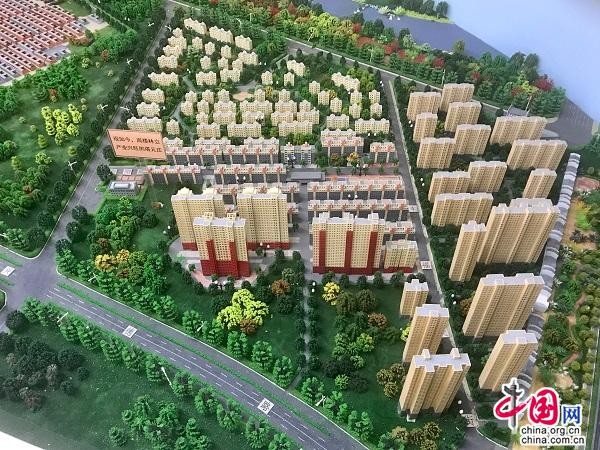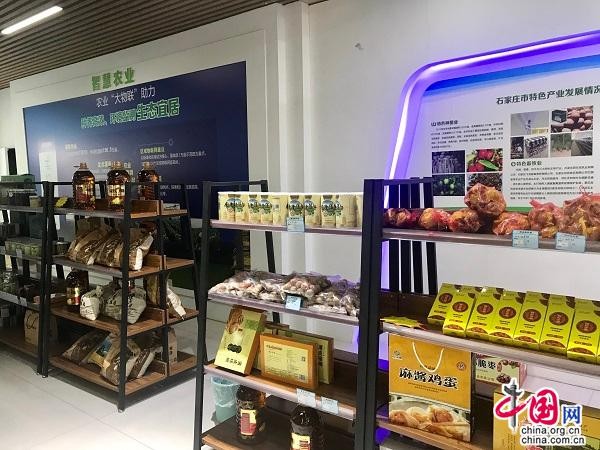The Hutuo River is located north of urban Shijiazhuang, the capital city of Hebei Province in North China.
In early fall, the river is clear, the land lush with vegetation and plants sway in the breeze.
On the north bank are rows of buildings.
Tayuanzhuang Village stands at this confluence of buildings and water to deliver an official vision of harmonious coexistence between human beings and nature.
When President Xi Jinping worked in Zhengding County of Hebei Province, he visited the village several times. He revisited in January 2008 and July 2013.

President Xi Jinping shakes hands with Tayuanzhuang villagers in North China’s Hebei Province. (Xinhua/Ju Peng)
Over the past 30 years, the cadres and masses of Tayuanzhuang Village have developed a "semi suburban" economy: They have consolidated the primary Communist Party of China (CPC) organization, industrialized agriculture, made a market out of nursing, standardized tourism and agglomerated efforts to rid the village of extreme poverty.
"President Xi cares about our village, and we will never forget it," said Yin Jiping, the village CPC branch secretary.
"Semi suburban"
Tayuanzhuang is located north of the Hutuo, with Shijiazhuang to its south.
In the early 1980s, the village was characterized by large tracts of wasteland. Cultivating their meager 50.7 hectares of land were more than 2,000 people from 500 households.
Li Guisuo's family planted corn in less than 667 square meters, or 1 mu, of land.
Li, a part-time handyman, supplemented his income doing odd jobs outside the village.
"At that time, there was no smooth road to the village, not to mention buses,” Li said. “I had to cycle for hours to get downtown and I earned at most 5 yuan a day.”
Despite their proximity to the provincial capital, the average Tayuanzhuang villager at that time earned less than 100 yuan a year.
The villagers even had a ditty for it: "Our only wish is to eat refined grain, build a house and marry someone."
In March 1982, Xi Jinping went to Zhengding County to serve as deputy CPC secretary and secretary of the county committee.
In view of its special location, Xi made a thorough investigation and advised the village develop a "semi suburban" economy.
“Cater to the tastes, serve the needs, maximize the gains and complement the shortcomings,” Xi said of the plan.
"From then on,” Li said, “we began to grow greenhouse vegetables, build chicken coops and pig sties. We planted what they wanted to eat and produced what they wanted to use.”
The strong urban demand prompted Li to try his hand at running his own business.
He built a shed in his yard, sawed, painted and delivered goods, all by himself.
"Within a few years I was earning 20,000 yuan a year,” Li said.
In the 1990s, he bought electric saws and cutting machines. He built a factory.
Li’s venture embodied the "semi suburban" economy ideal while also improving his neighbors’ livelihoods.
As furniture factories, cotton mills, component factories and other enterprises flourished, Tayuanzhuang villagers' incomes surged onwards and upwards.
By 1985, the average annual income of villagers exceeded 200 yuan.
Party organization
Tayuanzhuang was 4 kilometers from the county seat, but lacked a proper road throughout the 20th century.
"There were potholes everywhere, and when it rained, the village became a swamp," said Li Caifang, a villager in her 40s.
In 2000, Yin Jiping, who had been doing business in the city for years, was appointed village CPC branch secretary.
The first thing Yin did was to gather funding for a road.
Village cadres took the lead donating money. The village collected 130,000 yuan and raised 1.2 million yuan in coordination with the county government.
In 2003, the road was built.
Subsequently, roads were completed in all directions out of the village.
With the hardening, beautifying and brightening project, the village took on an altogether new look.
To improve the villagers’ living environment, the two committees of the village decided to launch a construction project that would repurpose more than 33 hectares of land.
The demolition of some of their houses engendered mixed opinions among the masses.
On January 12, 2008, Xi Jinping visited the village and walked with Yin along the village road, then under reconstruction.
"Knowing that we are intending to let all the villagers live in the buildings in three to five years, Xi especially told me that we should obtain the consent of the majority, Yin said.
“The plan should be formulated carefully and the construction should strictly follow the plan."
Yin remembered Xi’s words as: "I hope you can play a powerful role in leading the masses to be well-off."
Yin led leaders of the two village committees to visit house to house, listen to villagers' opinions and patiently explain their plans. He demolished his own house.
"The village CPC branch was open and fair," Yin said. “CPC members and cadres set the example, and the masses trusted us more than ever.”
In 2010, nearly 500 households moved into the newly completed Tayuanzhuang Village, with supermarkets and a sewage system.

A model of the new Tayuanzhuang Village in North China’s Hebei Province. (Photo: china.org.cn)
To increase its collective income, village authorities set up a collective cooperative for forest, fruit and vegetable planting. They attracted more than 200 households into taking shares.
A newly built mung beansprout factory with a daily output of 150 tons has increased the village’s collective income by 1 million yuan a year.
Modern agriculture
Early in the morning, Hu Lei headed for the village vegetable distribution site.
Since May 2020, villagers have been able to pick up organic vegetables once a week for free.
"I come here once a week to get the vegetables I need for one week," Hu posted on social media.
In a vegetable greenhouse in the west part of the village, Zhao Dong, an agricultural expert from Tayuanzhuang Agricultural Technology Company, was bending down to check plant growth.
The tomatoes were doing well. Zhao plucked out and bit one.
“It tastes sweet and sour,” Zhao said. “Zesty!"
Zhao’s company, initiated by the village collective cooperative, has applied advanced technology to produce green agricultural products.
A membership system was adopted for sales. Some 6 kilos and six varieties of vegetables are sold at weekly market stalls that draw in urban customers.

The agricultural products exhibition hall at the e-commerce public service center in Zhengding County, Hebei Province. (Photo: china.org.cn)
Nearly 500 villagers were automatically included for free in the first membership drive.
During his second visit in July 2013, President Xi Jinping had a new request for the village: "You need to build a well-off society ahead of schedule and realize agricultural industrialization, nursing marketization and tourism standardization."
The village had already implemented the president’s instructions, Yin said.
“We actively developed modern agriculture, built a production and marketing integrated agricultural industry chain, increased the village collective income and provided the villagers with green vegetables," he said.
Village authorities have built a modern science and technology demonstration park integrating agricultural production and tourism.
The village has also registered "Tayuanzhuang" as a trademark to sell green products nationwide including rice, flour and burdock wine.
Meanwhile, the long-dry Hutuo River has been rejuvenated through the implementation of a comprehensive project to restore its ecology and develop tourism.
Some 120,000 square meters of Magnolia and Chinese ash trees have been planted astride a landscape avenue on the river’s north bank.
Dozens of businesses have settled in the food court, where neat lines of vendors welcome visitors to take a stroll.
Cao Xinyu hails from Tayuanzhuang and returned home to operate his “whole donkey banquet” business in the court.
"The food court is attracting more tourists,” Cao said. “I’m optimistic about its further development. "
Wooden guesthouses have also sprouted up and last year the village received more than 500,000 visiting tourists and tour groups.
In 2019, the collective income of Tayuanzhuang hit 11 million yuan with per-capita income averaging 21,000 yuan.
(Translated by Li Yiran; edited by Huang Jingjing)


